In today’s privacy-conscious business landscape, many organizations are moving away from cloud-based solutions and embracing self-hosted alternatives for their team communication needs.
Whether you’re concerned about data sovereignty, compliance requirements, or simply want full control over your communication infrastructure, self-hosted Slack alternatives offer the perfect solution.
As more businesses prioritize data security and seek to reduce dependency on third-party services, the demand for robust self-hosted communication platforms has skyrocketed.
This comprehensive guide explores the top 10 self-hosted alternatives to Slack, which deliver enterprise-grade features while keeping sensitive conversations completely under your control.
Why Choose a Self-Hosted Slack Alternative?
Before diving into our top picks, let’s understand why organizations are increasingly opting for self-hosted solutions over SaaS platforms like Slack:
Complete Data Control
When you self-host your communication platform, your data never leaves your servers. This is crucial for organizations handling sensitive information, government agencies, healthcare providers, and any business operating in highly regulated industries. You decide where your data lives, who has access to it, and how it’s protected.
Enhanced Security and Compliance
Self-hosted solutions allow you to implement your own security protocols, encryption standards, and access controls. This makes it easier to comply with regulations like GDPR, HIPAA, or industry-specific requirements. You’re not at the mercy of a third-party provider’s security practices.
Cost Savings at Scale
While the initial setup might require more investment, self-hosted solutions often prove more economical in the long run, especially for larger organizations. Most subscription services, such as Slack, require ongoing costs that can rack up very quickly. With self-hosting, you avoid perpetual subscription fees that increase with each user.
Customization Freedom
Unlike third-party tools, self-hosted solutions would not “lock you in” to a strict feature set but can be fully tailored to suit your exact business needs. You can modify the interface, add custom integrations, and develop features specific to your workflow.
No Vendor Lock-in
With self-hosted solutions, you’re never dependent on a vendor’s business decisions, pricing changes, or service availability. Your communication infrastructure remains stable regardless of external factors.
Self-Hosted Slack Alternatives Overview
| Platform | Starting Price | Free Trial Details | |
|---|---|---|---|
| Mattermost | $10/user/month | Free for teams up to 10 users | Try Now |
| Rocket.Chat | $3/user/month | Community edition free forever | Start Free |
| Zulip | Free | No paid tiers – completely free | Get Started |
| Element (Matrix) | Free | Free and open-source | Try Today |
| Nextcloud Talk | €1,900/year (50 users) | Free with Nextcloud | Explore Now |
| Wire | $5.83/user/month | Available for enterprise | Secure Chat |
| Chanty | $3/user/month | Free for up to 10 users | Join Free |
| Twake | Enterprise pricing | Free for up to 3 users | Try Today |
| Jami | Free | Completely free and open-source | Download Now |
| Discourse | $100/month (hosted) | Free and open-source | Build Community |
Our Top 10 Self-Hosted Slack Alternatives for 2025
1. Mattermost – Best for Enterprise Security
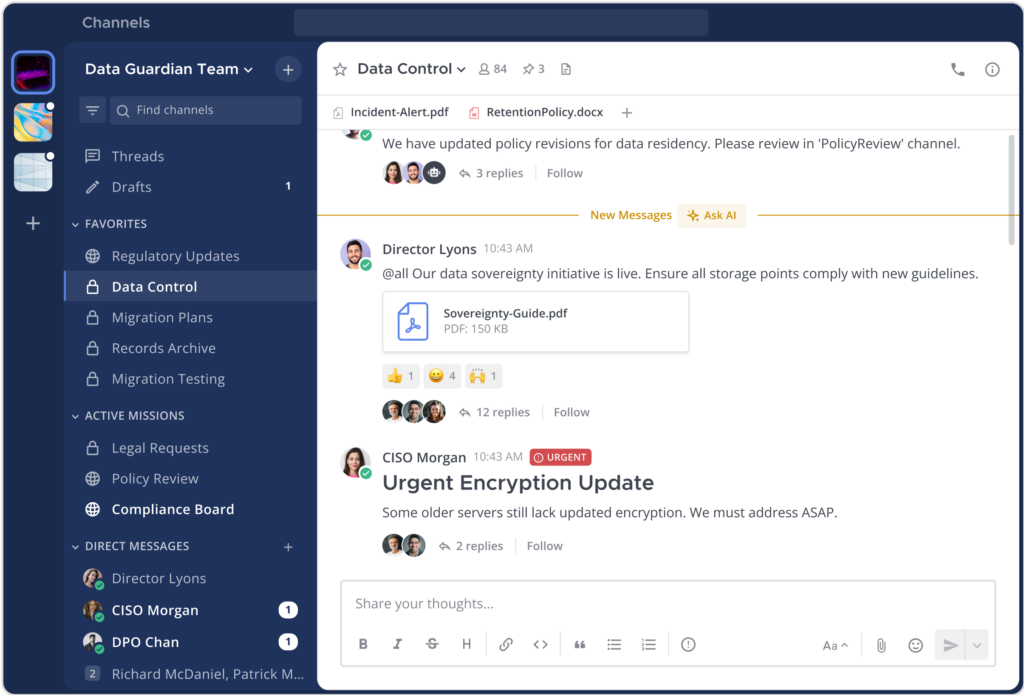
Mattermost is an open-source Slack alternative that focuses on security and team productivity, making it ideal for privacy-conscious organizations. Trusted by enterprises and government agencies worldwide, Mattermost delivers military-grade security without compromising on features.
Key Features:
- End-to-end encryption for maximum security,
- Advanced compliance features (SOC2, HIPAA compliant),
- Extensive API for custom integrations,
- DevOps-focused features including code syntax highlighting,
- Workflow automation with playbooks,
- Self-hosted deployment on-premises or private cloud.
Why Choose Mattermost: Unlike Slack, Mattermost is open source and yours to customize. With on-premises deployment options, your data stays in your control — always. It’s particularly popular among technical teams who appreciate its developer-friendly features and extensive customization options.
Pricing: Free for teams up to 10 users, with paid plans starting at $10/user/month for additional features and support.
Best For: Large enterprises, government agencies, and organizations with strict security requirements.
For more insights on team collaboration statistics, check out our comprehensive guide.
2. Rocket.Chat – Best Open-Source Community
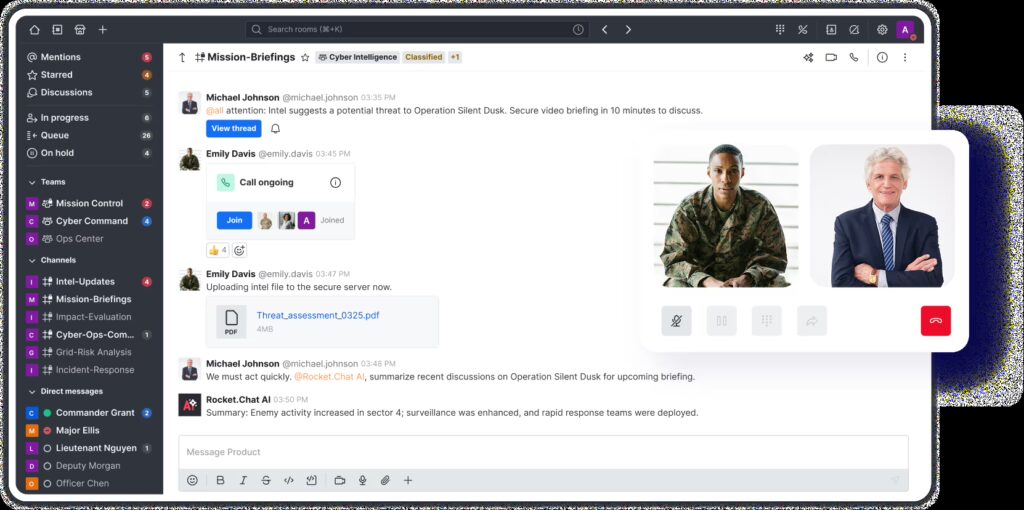
Available in Linux, Windows, MacOS, Android and iOS, this chat app is a team collaboration tool that differentiates itself mainly in terms of data protection. Rocket.Chat boasts one of the largest open-source communities, ensuring continuous development and support.
Key Features:
- Omnichannel customer engagement,
- End-to-end encryption,
- Live chat widgets for websites,
- Video conferencing and screen sharing,
- Extensive marketplace with 100+ integrations,
- White-labeling options.
Why Choose Rocket.Chat: The platform offers incredible flexibility with deployment options ranging from small team servers to enterprise-grade installations. Its active community means you’ll find solutions to almost any challenge.
Pricing: Community edition is free and open-source. Enterprise plans start at $3/user/month for self-hosted deployments.
Best For: Organizations seeking a mature, well-supported platform with extensive customization options.
3. Zulip – Best for Organized Conversations
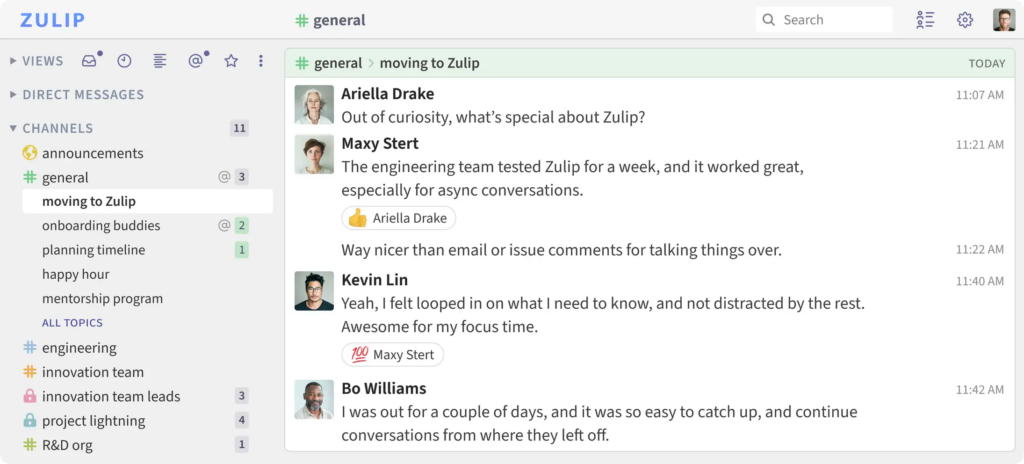
Zulip combines real-time chat and email threading to provide instant messaging. Its unique topic-based threading system makes it exceptional for teams managing multiple projects or complex discussions.
Key Features:
- Revolutionary topic-based threading,
- Powerful search and message history,
- 90+ native integrations,
- Mobile apps with full feature parity,
- Markdown support with LaTeX rendering,
- Open-source with transparent development.
Why Choose Zulip: The ability to organize messages by streams and topics provides clarity and structure that is a lifesaver when teams are busy and multiple discussions are happening. Perfect for distributed teams working across time zones.
Pricing: Unlike the competition, you don’t pay for SAML authentication, LDAP sync, or advanced roles and permissions. There is no “open core” catch — just freely available world-class software.
Best For: Technical teams, research organizations, and distributed teams needing highly organized communication.
Learn more about IT communication software options for your business needs.
4. Element (Matrix) – Best for Decentralized Communication
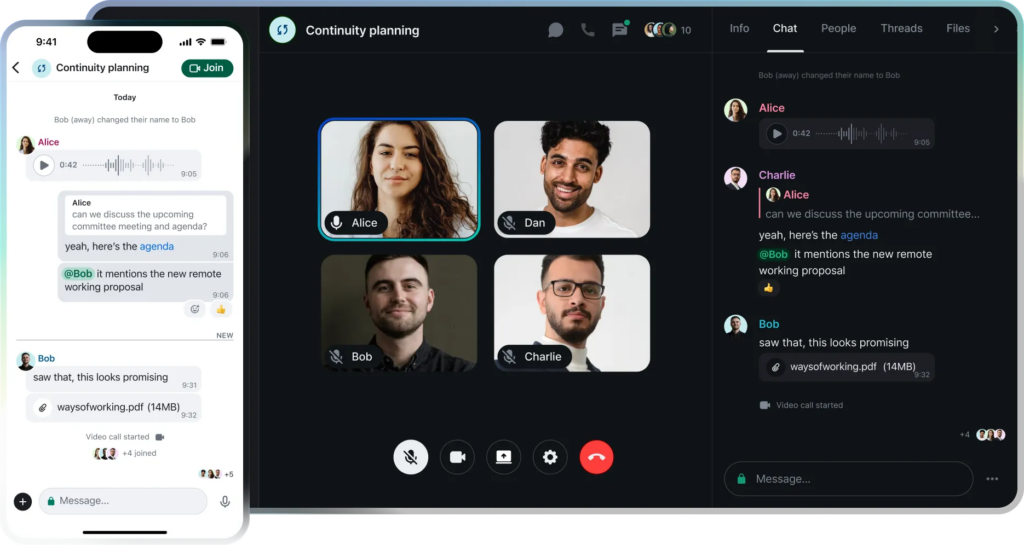
Unlike Slack and Mattermost, Element joins Rocket.Chat as one of the safest Slack alternatives because it has end-to-end encryption. Built on the Matrix protocol, Element offers a decentralized approach to team communication.
Key Features:
- Decentralized architecture,
- End-to-end encryption by default,
- Federation with other Matrix servers,
- Bridges to Slack, Discord, Telegram, and more,
- Voice and video calls,
- Spaces for organizing teams and projects.
Why Choose Element: Element’s decentralized nature means you can communicate with users on other Matrix servers while maintaining complete control over your own infrastructure. It’s the future of open communication.
Pricing: Free and open-source for self-hosting. Paid support plans are available.
Best For: Privacy-focused organizations, government agencies, and teams requiring cross-organization communication.
5. Nextcloud Talk – Best All-in-One Solution
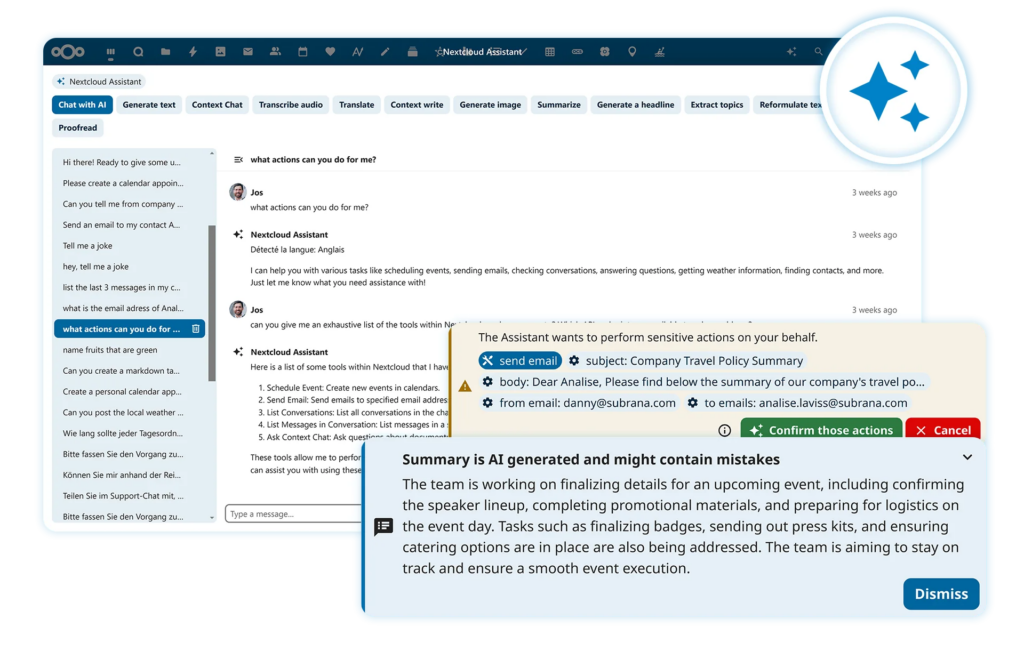
If you’re already using Nextcloud for file storage, Nextcloud Talk integrates perfectly into your existing workflow. It seamlessly combines file storage, collaboration, and communication in one platform.
Key Features:
- Integrated with Nextcloud’s file storage,
- Video calls and screen sharing,
- End-to-end encrypted calls,
- Mobile and desktop apps,
- Virtual backgrounds and blur,
- SIP integration for phone systems.
Why Choose Nextcloud Talk: Nextcloud Talk protects your communication better that other team collaboration platforms such as Microsoft Teams and Slack. Your data will stay on your servers.
Pricing: Free with Nextcloud. Enterprise support starts at €1,900/year for 50 users.
Best For: Organizations already using Nextcloud or seeking an integrated collaboration suite.
Explore our communication and collaboration software guide for more integrated solutions.
6. Wire – Best for Encrypted Communications
Wire stands out with its focus on security and elegant design. Wire has the sleekest interface of all the Slack alternatives on this list. It’s intuitive and effortless to use.
Key Features:
- End-to-end encryption for all communications,
- Crystal-clear voice and video calls,
- Guest rooms for external collaboration,
- Compliance with global security standards,
- Cross-platform synchronization,
- Timed messages and message deletion.
Why Choose Wire: Wire offers enterprise-grade security with consumer-grade usability. It’s independently audited and meets the strictest compliance requirements.
Pricing: Starting at $5.83/user/month for self-hosted deployments.
Best For: Financial institutions, legal firms, and security-conscious enterprises.
7. Chanty – Best for Small Teams
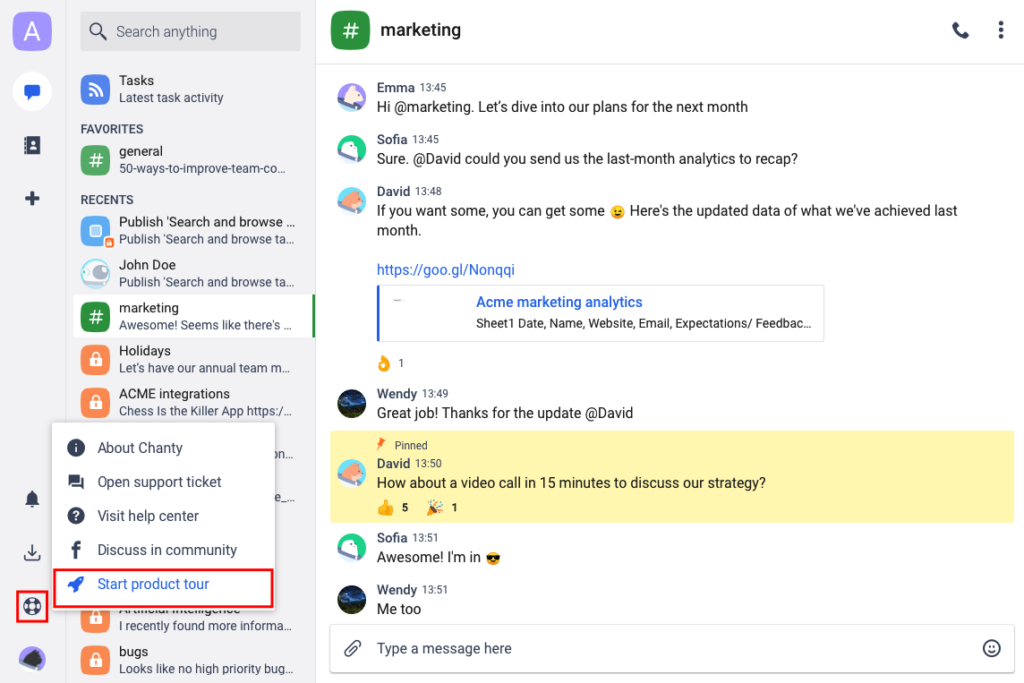
Chanty is a Slack alternative that doesn’t limit its message history even in the free plan that is good for teams with up to 5 users.
Key Features:
- Unlimited message history,
- Built-in task management,
- Voice messaging,
- Screen sharing and video calls,
- Team book for organized information,
- AI-powered assistance.
Why Choose Chanty: Chanty’s straightforward approach and integrated task management make it perfect for small teams that need simplicity without sacrificing functionality.
Pricing: Free for up to 10 users. Paid plans start at $3/user/month.
Best For: Startups, small businesses, and teams prioritizing ease of use.
8. Twake – Best Collaborative Workspace
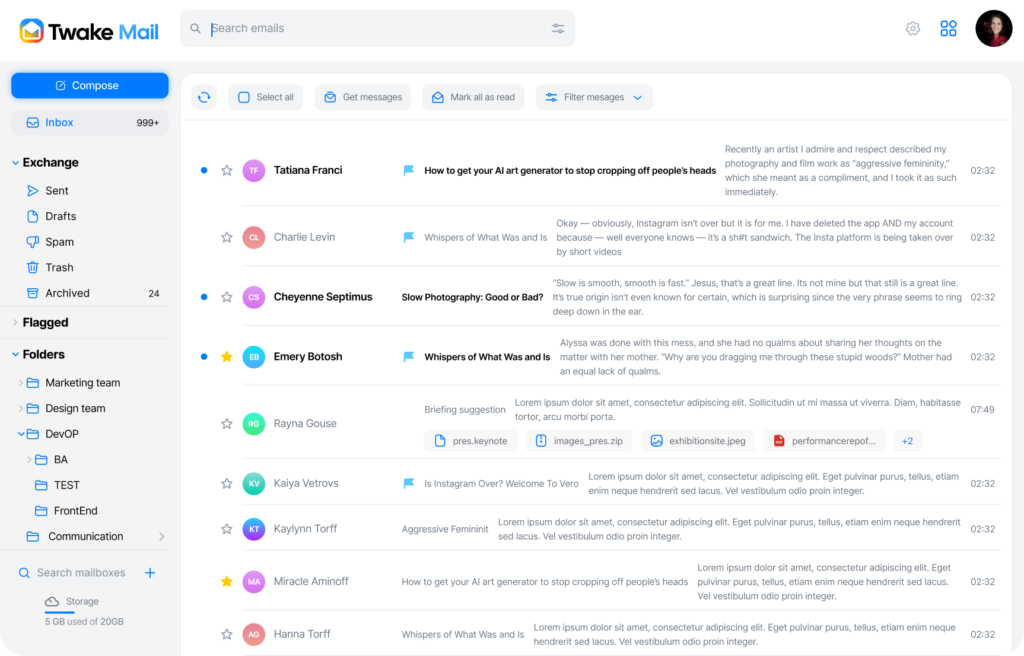
Twake goes beyond messaging to offer a complete digital workplace. It combines team chat, file storage, calendar, and task management in one unified platform.
Key Features:
- Integrated task management,
- Collaborative documents,
- Video conferencing,
- Calendar synchronization,
- Drive for file storage,
- Open-source and customizable.
Why Choose Twake: Twake’s all-in-one approach reduces tool fragmentation and keeps everything your team needs in one place.
Pricing: Free for up to 3 users. Self-hosted version available with enterprise support.
Best For: Teams seeking a comprehensive collaboration platform beyond just messaging.
9. Jami – Best for Peer-to-Peer Communication
Jami offers a unique approach with its distributed, peer-to-peer architecture. No central server means ultimate privacy and resilience.
Key Features:
- No central server required,
- End-to-end encryption,
- Audio/video calls,
- Screen sharing,
- File transfer,
- Cross-platform support.
Why Choose Jami: Jami’s serverless architecture makes it incredibly resilient and private. Perfect for teams that prioritize decentralization.
Pricing: Completely free and open-source.
Best For: Privacy advocates, activists, and teams requiring serverless communication.
10. Discourse – Best for Community-Style Communication
While different from traditional chat apps, Discourse offers a forum-based approach that works excellently for certain team communication styles.
Key Features:
- Threaded discussions,
- Real-time updates,
- Powerful search,
- Extensive plugin system,
- Mobile apps,
- Gamification features.
Why Choose Discourse: For teams that prefer asynchronous, thoughtful communication over rapid-fire messaging, Discourse provides an excellent alternative.
Pricing: Free and open-source. Hosted plans available from $100/month.
Best For: Remote teams, open-source projects, and organizations preferring forum-style communication.
Check out our Troop Messenger review for another self-hosted option worth considering.
Key Factors to Consider When Choosing a Self-Hosted Solution
Technical Requirements
Before selecting a platform, assess your technical capabilities:
- Server infrastructure: Do you have the hardware or cloud resources?
- Technical expertise: Can your IT team handle deployment and maintenance?
- Scalability needs: Will the solution grow with your organization?
Security Features
Evaluate each platform’s security offerings:
- Encryption standards (end-to-end vs. transport layer)
- Authentication methods (SSO, 2FA, LDAP integration)
- Compliance certifications
- Audit logging capabilities
Integration Ecosystem
Consider how the platform will fit into your existing workflow:
- API availability and documentation
- Pre-built integrations with your current tools
- Webhook support for custom automations
- Import tools for migrating from your current platform
User Experience
Don’t sacrifice usability for security:
- Intuitive interface for non-technical users
- Mobile app quality and features
- Onboarding and training resources
- Performance and reliability
Total Cost of Ownership
Look beyond licensing fees:
- Hardware and hosting costs
- Maintenance and updates
- Training and support
- Potential downtime costs
Migration Best Practices
Moving from Slack or another platform to a self-hosted solution requires careful planning:
- Data Export: Most platforms offer tools to export your Slack data. Ensure you have complete backups before starting.
- Pilot Testing: Start with a small team to iron out issues before organization-wide deployment.
- Training Plan: Develop comprehensive training materials and consider appointing champions within each team.
- Phased Rollout: Migrate teams gradually rather than all at once to minimize disruption.
- Integration Migration: Audit your current integrations and plan how to replicate them in the new system.
The Future of Self-Hosted Communication
As data privacy regulations tighten and cyber threats evolve, self-hosted communication platforms are becoming increasingly sophisticated. Several open-source team chat applications have been around for years, and are solid options if you are looking to self-host your team chat solution
The trend toward digital sovereignty and data ownership shows no signs of slowing. Organizations are recognizing that controlling their communication infrastructure is not just about security—it’s about maintaining competitive advantage and operational independence.
Visit our contact page if you need personalized recommendations for your organization.
Conclusion
Choosing the right self-hosted Slack alternative depends on your organization’s specific needs, technical capabilities, and priorities. Whether you prioritize security like Mattermost and Wire, prefer organized conversations like Zulip, or need an all-in-one solution like Nextcloud Talk, there’s a self-hosted option that fits your requirements.
The key is to thoroughly evaluate your needs, test potential solutions, and plan your migration carefully. With the right self-hosted platform, you’ll gain complete control over your team’s communication while potentially saving money and definitely increasing security.
Remember, the best platform is the one your team will actually use. Consider involving key stakeholders in the decision-making process and prioritize user experience alongside technical requirements.
Ready to take control of your team’s communication? Start with a pilot project using one of these platforms and experience the benefits of self-hosted communication firsthand. Your data—and your team—will thank you.
Learn more about our team and how we evaluate collaboration software, or explore our comprehensive project management software reviews for additional productivity tools that integrate with these communication platforms.
